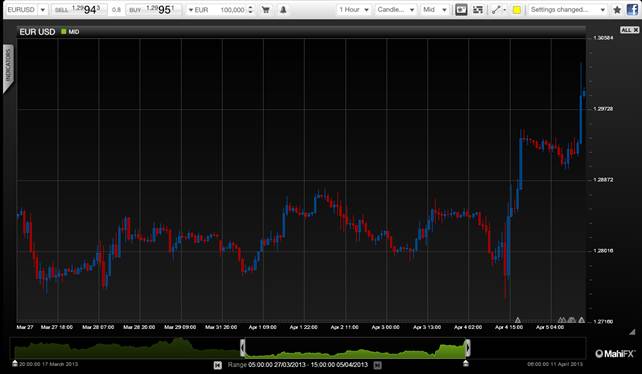The rate of jobs creation in March slowed sharply in the US economy with 88,000 created against expectations of something closer to 190,000, according to a poll of analysts conducted by Bloomberg. USD quickly sold off, but could this actually mark a return to risk aversion?
Selling of risk assets such as equities and commodities is often mirrored by flows into government bonds of highly credit rated countries and in particular US Treasuries – and that means buying USD, the world’s safe haven currency.
By Justin Pugsley, Markets Analyst MahiFX.
The non-farm payrolls numbers are a concern as it appeared jobs creation had been strengthening since late last year in the US. Nonetheless, the unemployment rate fell to 7.6% in March from 7.7% in February. Though one month’s numbers do not make a trend, and this one could be a one off, there are a number of headwinds buffeting the US economy, which may have influenced these numbers and those to come.
Maybe just a short-term bounce for EURUSD
US sequestration is definitely one of them where the government implemented from March 1 a steady stream of rolling spending cuts leading to salary reductions and redundancies of workers in various public sector bodies. There are also payroll tax hikes taking place across the country.
The spending reductions are about $85.4 billion for the fiscal year 2013 and the US Congressional Budget Office estimates they could shave 0.6% off US economic growth. Given the US economy is not that strong these cuts could in months to come have a disproportionately negative impact.
This of course puts more emphasis on the US Federal Reserve’s monetary policy to offset the fiscal drag created by sequestration. That along with the weak jobs numbers no doubt means the Fed won’t be turning off the monetary taps any time soon and certainly not this year. Gold perked up a little no doubt due to that factor – though it still remains in a short- to medium-term bear market.
The other factor is persistently high oil prices and for a relatively energy intensive economy like the US that has a definite impact of reducing disposable income. Traditionally high oil prices have been key to tipping the US economy into recession. On the flip side US consumers and industry have enjoyed the benefits of the shale gas revolution leading to much lower natural gas prices than seen in other parts of the world.
A potentially slowing US economy will weigh heavily on global conditions with the Eurozone looking sicklier by the month with even the mighty Germany looking sluggish. Certainly the Eurozone crisis is far from over and will no doubt erupt again sometime this year with the periphery mired in depression conditions. A global economic slowdown would make another flare up of the Eurozone crisis more likely.
If fear is to return to the markets – and it will require more data to prove the US economy is definitely slowing as some recent numbers have been positive – then USD would probably be given a jolt upwards versus currencies such as CAD, GBP, AUD and the structurally flawed EUR.
Ironically, JPY may strengthen, despite the best efforts of the Bank of Japan, as investors there repatriate funds home as they often do when a crisis strikes.
Further reading: Forex Analysis: EUR/JPY Continues Recovery Targeting Higher Highs

